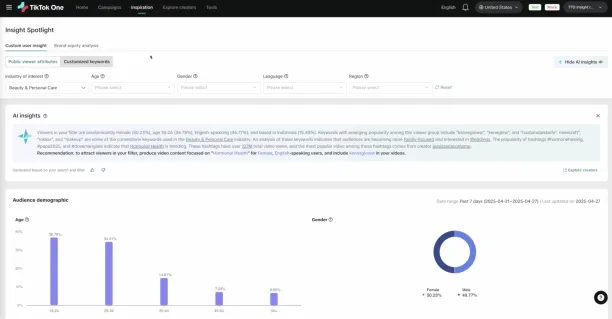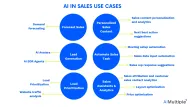Every day, millions of articles compete for visibility online. AI-powered automation and personalization have become essential to stay ahead.
Therefore, businesses increasingly turn to AI for SEO strategies to boost brand awareness and generate leads.
Explore the top 10 use cases and case studies on how SEO AI can enhance content marketing.
1. Keyword search
Artificial intelligence enhances keyword research by moving beyond simple search volume checks. AI seo tools analyze search intent, semantic context, and keyword difficulty across multiple websites. This helps seo specialists uncover related terms, user questions, and gaps in competitors’ strategies.
Tools with machine learning can cluster keyword suggestions into topical groups, supporting topical authority. This enables content teams to map out content clusters and improve internal linking. AI-powered keyword analysis also surfaces long-tail keywords and voice queries, especially relevant for optimizing content for search engines’ evolving algorithms.
Real-life example: BrightEdge SEO AI
BrightEdge is an SEO solution vendor that has an AI-powered keyword research tool, Instant. Instant uses AI to identify the most relevant topics and keywords to go after.
The tool takes a seed list of relevant keywords and gives you 100X more keywords that you can target. You can also benchmark keywords based on countries so that you can target specific countries.1
Real-life example: Rocky Brands & BrightEdge
Rocky Brands’, a footwear retail company, main focus is to create SEO-friendly content to increase organic search revenue. They implemented BrightEdge’s tools to prioritize and formulate effective SEO strategies. They used different tools such as:
- Data Cube: To reveal keywords that they need to target to drive organic traffic to their website.
- BrightEdge recommendations: To optimize content such as page titles and meta tags.
- Storybuilder: To track the impact of website optimization efforts on brand equity and revenue.
- Keyword and page reporting: To track the performance of keywords and content on pages.
Following the implementation of SEO software, Rocky Brand experienced a 30% increase in search revenue, a 74% year-over-year (YoY) revenue growth, and a 13% increase in new users.2
2. Content generation
AI writing tools can quickly generate content drafts. These are used to create optimized content such as blog posts, product descriptions, and meta descriptions. By analyzing search intent and word count trends, AI can propose content structures aligned with Google’s algorithms.
More advanced systems assist with detailed content briefs, generate schema markup, and select relevant images. AI-generated content is increasingly used to expedite content production; however, it should be reviewed by SEO professionals or content editors for quality and natural language clarity.
For SEO agencies and content teams managing multiple projects, this reduces manual seo work and supports consistent content creation.
Real-life example: Fugue & Frase.io
Fugue is a cloud infrastructure security and compliance vendor. Their Cloud Security Posture Management (CSPM) solution competes in cloud security searches, where the competition is high due to the presence of vendors with high-quality offerings.
Fugue leveraged Frase.io SEO tool to optimize their CSPM page, and this collaboration helped them to:
- Identify the topics that need to be added to the page.
- Compare the content to the best-performing content in the same segment.
Fugue’s CSPM page rank advanced to 1st place from 10th position as a result of their collaboration with Frase.io.3
3. Running tests and measuring results
AI SEO software enables the execution of structured A/B tests on SEO content. For example, changing meta titles or experimenting with different calls to action can be measured for impact on organic traffic. AI tools detect subtle changes in performance across client websites and identify essential SEO elements that influence ranking.
Some tools integrate with platforms like Google Search Console to gather live data and automatically detect anomalies in SEO efforts. AI’s ability to track and evaluate test results over time helps SEO experts identify what aligns best with search intent and optimize content accordingly.
Real-life example: SEO Scout
SEO Scout’s tool enables you to compare your content to competitors by using natural language processing (NLP). You can also test and analyze different titles and meta descriptions, and you can choose the snippet that gets more clicks for the same positions.4
Another approach is to test different titles and meta descriptions over time. Though this is a more time-consuming approach, its results reflect how these changes impact your traffic.
4. Personalization
AI-powered personalization enables content variation based on location, user behavior, and device. For instance, tailoring content for local SEO involves adapting keyword usage and linking structures. This is vital for businesses targeting multiple regions.
Search engines favor personalized and relevant experiences. AI SEO tools can dynamically adapt elements such as meta tags, headings, or product recommendations, which supports both user engagement and ranking.
Personalization also benefits SEO workflows for eCommerce platforms by enabling tailored product descriptions and category pages.
Real-life example: OneSpot
OneSpot’s AI utilizes machine learning, NLP, and individual web browsing history data to deliver relevant content to each visitor.
With OneSpot’s solution, organizations can build a relationship with consumers, increase the number of website visitors, and extend the time spent on their website.5
These solutions tend to focus on eCommerce applications, as it is more complex to customize long-form text content. Check out recommendation engine vendors for more personalized results.
5. Prioritization with analytics
AI helps prioritize SEO tasks based on their impact, rather than relying on guesswork. AI SEO tools utilize analytics tools to process large-scale site data. The aim is to identify which fixes will cause the most significant contributions to organic search improvements. This includes assessing broken links, indexing issues, or outdated SEO content.
By analyzing client projects, Google Search Console Data, and competitive gaps, artificial intelligence scores and ranks opportunities, helping teams focus on high-value actions. This is essential for SEO agencies needing to manage multiple websites or maintain tight SEO workflows.
Real-life example: Millimetric.ai
Millimetric.ai analyzes the search console for anomalies, prioritizes pages to act on, and helps businesses discover the root causes of anomalies.6
Real-life example: STACK Media
STACK Media is a content delivery website to inform professional and amateur athletes. The company collaborated with BrightEdge to increase its web traffic. As a result of this collaboration, the STACK team was able to:
- Identify keywords that had a high search volume and were relevant to the fitness category.
- Analyze the SERP visibility of these keywords.
- Conduct competitive research, such as identifying the content themes and structures of the page URLs that ranked high on SERPs.
With this partnership, STACK Media website visits increased by 61% and average bounce rate per page reduced by 73%.7
6. Voice search optimization
Voice queries are conversational and often location-based. AI tools help adapt content to reflect the trends in natural language processing that drive voice search. This includes structuring content with FAQs, using long-tail keywords, and including direct answers that match spoken queries.
With the rise of voice-enabled search engines and assistants, optimizing for voice search supports better visibility. AI helps identify question-based keywords, match user queries to search intent, and modify sentence structures to sound more like human writing.
Real-life example: Dialogflow
Google’s Dialogflow is the most widely used tool for taking action on over 400 million Google Assistant devices. It utilizes machine learning to understand and analyze user input, enabling you to respond with greater accuracy.
7. Automated SEO audit
AI SEO software can conduct detailed SEO audits faster than manual reviews. It scans for missing meta tags, duplicate content, slow-loading pages, broken links, orphan pages, and crawl issues. It also assesses the quality of internal linking and provides actionable recommendations.
AI-based audits help detect gaps in essential SEO elements and technical SEO problems. This supports ongoing SEO efforts, ensuring that client websites remain aligned with SEO best practices and Google’s evolving requirements.
Real-life example: SEO.AI
SEO.AI offers AI-driven SEO audits that analyze top-ranking articles to provide insights into competitors’ strengths and weaknesses. This enables businesses to identify opportunities for improvement in their content, ensuring alignment with SEO best practices and enhancing overall search performance.8
8. Search trends prediction
AI-powered systems analyze historical search volume data, seasonality patterns, and emerging topics to forecast search trends. This helps teams generate content ahead of demand and plan SEO campaigns with greater timing precision.
By understanding what search intent is likely to rise in the future, SEO professionals can create optimized content and secure rankings before competition increases.
Real-life example: TikTok
TikTok has introduced an AI-powered tool, Insight Spotlight, allowing brands to filter content by user demographics and industry. This tool provides AI-generated ad suggestions based on trending videos and keywords, enabling advertisers to effectively anticipate and align with emerging search trends.

Figure 1: TikTok’s AI-powered insights on user data.9
9. Image and video optimization
AI can evaluate visual content and generate alt text, captions, and tags that reflect the context and target keywords. Some tools offer automatic image generation or recommend visual improvements that align with Google’s image indexing requirements.
Optimizing multimedia content with AI supports better ranking in image search results and enhances accessibility, both of which are essential elements in modern SEO strategies.
Real-life example: Pictory
Pictory AI enhances video SEO by automating tasks such as summarization, transition effects, and visual enhancements. It also provides accurate transcriptions, captions, and subtitles for videos, ensuring that textual components align with relevant keywords, thereby improving search engine visibility and ranking.10
10. SERP feature targeting
Search engine results pages (SERPs) include features like featured snippets, “People also ask”, and image carousels. AI can analyze which formats competitors are ranking for and guide optimization for those placements.
For example, AI-generated content can be structured with question-answer formats to increase chances of ranking in featured snippets. Similarly, generating schema markup enhances visibility in rich results.
Real-life example: The Search Initiative
The Search Initiative helped a U.S.-based B2B marketing firm achieve over 3,000% growth in organic traffic and top-ranking keywords through a targeted SEO campaign. Key actions included building topical authority through clustered supporting content, optimizing on-page elements, and restructuring the site architecture for improved crawlability.
They implemented structured data for rich results and launched a focused link-building strategy.
A critical part of the success was user intent optimization: they analyzed top-ranking SERP content for each keyword. They aligned the format and purpose of their content to match user expectations, driving higher engagement and visibility.11
FAQ
What is SEO?
SEO, or Search Engine Optimization, is the process of improving a website’s ability to appear in search results on platforms like Google Search. The primary goal is to increase organic traffic by aligning content with user behavior and search engine criteria. SEO professionals use keyword analysis to identify terms with high search volume and low keyword difficulty. These target keywords serve as the foundation for creating and optimizing content that aligns with search intent.
Effective SEO includes both on-page and technical SEO work. On-page practices focus on optimizing meta titles, meta descriptions, heading structure, and internal linking. Content should be structured, use relevant keywords, and follow word count ranges that reflect top-ranking pages. Supporting elements, such as schema markup and alt attributes, contribute to essential SEO elements and enhance visibility in search results.
Technical SEO addresses issues such as crawl depth, page speed, mobile usability, and broken links. Tools like Google Search Console are essential for monitoring crawl errors, indexing status, and search queries. SEO audits are used to identify problems and prioritize fixes across client websites.
What is SEO AI?
AI tools now play a growing role in SEO workflows. AI SEO software and AI-powered platforms help generate content drafts, recommend content optimization, and automate certain SEO tasks. AI SEO tools can assist with producing SEO optimized articles, analyzing search engine results pages, and generating structured data.
For instance, an AI writing tool can support content creation by developing product descriptions, blog posts, and topical clusters based on keyword suggestions and search intent.
SEO best practices
Conduct keyword research: Identify relevant keywords with high search volume and low competition using SEO tools.
Optimize content: Ensure content is high-quality, includes target keywords, and aligns with search intent. Use detailed content briefs to guide the SEO writing process.
Use meta descriptions and title tags: Write concise, compelling meta descriptions and meta titles that improve click-through rates and reflect SEO best practices.
Implement structured data: Apply schema markup to help search engines understand and display your content in rich results. This supports essential SEO elements.
Improve page speed: Optimize technical SEO aspects, such as image size, caching, and code efficiency, to enhance user experience and improve visibility in search engine rankings.
Further reading
- Top Use Cases of ChatGPT in Marketing
- Top SEO Copywriting Tools to Boost Content Strategy
- Top Content Writing Statistics
External Links
- 1. https://www.brightedge.com/products/instant
- 2. https://www.brightedge.com/resources/case-studies/rocky-brands
- 3. https://www.frase.io/case-studies/fugue/
- 4. https://seoscout.com
- 5. https://www.onespot.com
- 6. https://www.millimetric.ai/product/
- 7. https://www.brightedge.com/resources/case-studies/stack
- 8. Extensive SEO Audits By SEO.AI.
- 9. TikTok will give advertisers even more data on trends and users | The Verge. The Verge
- 10. SEO Case Study: How Pictory AI Boosted SEO. QuickCreator
- 11. B2B Marketing Services Case Study | The Search Initiative.



Comments
Your email address will not be published. All fields are required.